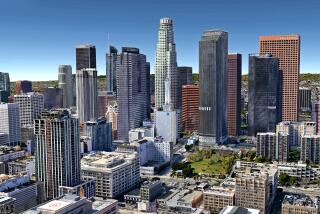Ned Fox builds an open, casual atmosphere at Playa Jefferson
From some classic Adirondack chairs in front of his colorful new office complex near Marina del Rey, commercial landlord Ned Fox can sit back and watch his property value go up.
The developer who made his bones building skyscrapers in downtown Los Angeles during the late 1980s and early 1990s today finds himself with a close-up view of the rapidly evolving planned community of Playa Vista and the young tech and entertainment workers transforming the culture of what’s become known as L.A.’s “Silicon Beach.”
It’s turning into a busy neighborhood. Right across the street from Fox’s new office complex, steel girders and concrete walls are rising in one of the largest commercial projects underway in Southern California.
Meanwhile, Fox’s work at his office complex, called Playa Jefferson, is mostly done. He saw to it that a fancy metal Foosball table was covered with a thick sheet of plastic in case of rain Monday but showed no concern for plush outdoor furniture nearby that he says is waterproof.
It’s all part of the intentionally casual atmosphere at Playa Jefferson, which is delineated by three outdoor areas: the Front Yard, the Back Yard and the Commons — where the Foosball table sits. Visiting gourmet food trucks can pull into a reserved parking spot right off the Commons.
Fox has pivoted from building high-rises to joining the newest trend in commercial real estate — making so-called creative office space that sports an open, casual atmosphere.
Across the street, developer Lincoln Property Co. is hard at work on a $260-million retail, housing and office and housing project called the Runway that will become the commercial heart of Playa Vista.
The neighborhood that was once considered undesirably remote for most white-collar businesses has emerged as a prime address for creative types who prize the laid-back look in their workplaces.
Tenants in the area include YouTube, entertainment media company TMZ and Sony Computer Entertainment. The Runway will include a Whole Foods grocery store, a 10-screen Cinemark movie theater, “chef-driven” restaurants and shops. There will also be apartments and offices.
The Runway should open by November, said David Binswanger of Lincoln Property.
Playa Vista already has more than 3,200 residences and still more are under construction. The Irvine Co. is building hundreds of apartments next to the Runway.
“Employees can live and work in the area,” Fox said. “Playa Vista, from an office point of view, is really maturing and coming into its own.”
Fox and his partner, Stuart Gulland, founded Vantage Property Investors in Manhattan Beach in 2003 to get in on the new trend in office development. Their two projects so far are a renovation of an old industrial building in the tech-centric South of Market neighborhood in San Francisco and Playa Jefferson.
Playa Jefferson is on land that was once part of Lopez Farms, which grew row crops across the street from mogul Howard Hughes’ aviation business headquarters.
Industrial and office buildings eventually filled in the farmland. The last occupant of the four buildings at Playa Jefferson was Citibank, which used them for processing bank business and research-and-development work on the bank’s automated teller machines. Citibank hid them behind a wall of trees and landscaping.
“It was kind of private,” Fox said. “Citibank turned its back on the street.”
Fox and Gulland bought the complex in 2011 for $35 million and went the opposite direction in appearance, pulling down the concealing foliage and painting the buildings bright colors. In a move suggested by their architecture firm, Gensler, the pair tore the sides off an atrium that connected to buildings and created the outdoor Commons.
The $20-million makeover also included the addition of a wooden deck and vertical metal bike racks.
“We mixed our building materials,” Gulland said. “We want people to feel grounded to the environment.”
In the 1980s and early 1990s, when Fox worked with developers Robert Maguire and James Thomas to build skyscrapers in downtown L.A., most companies wanted to give employees individual offices or at least cubicles. That model is fading, Fox said.
“Companies are flattening their corporate structures, sharing information and working in collaborative groups,” he said. “Walls are less important.”
Twitter: @rogervincent
More to Read
Inside the business of entertainment
The Wide Shot brings you news, analysis and insights on everything from streaming wars to production — and what it all means for the future.
You may occasionally receive promotional content from the Los Angeles Times.











